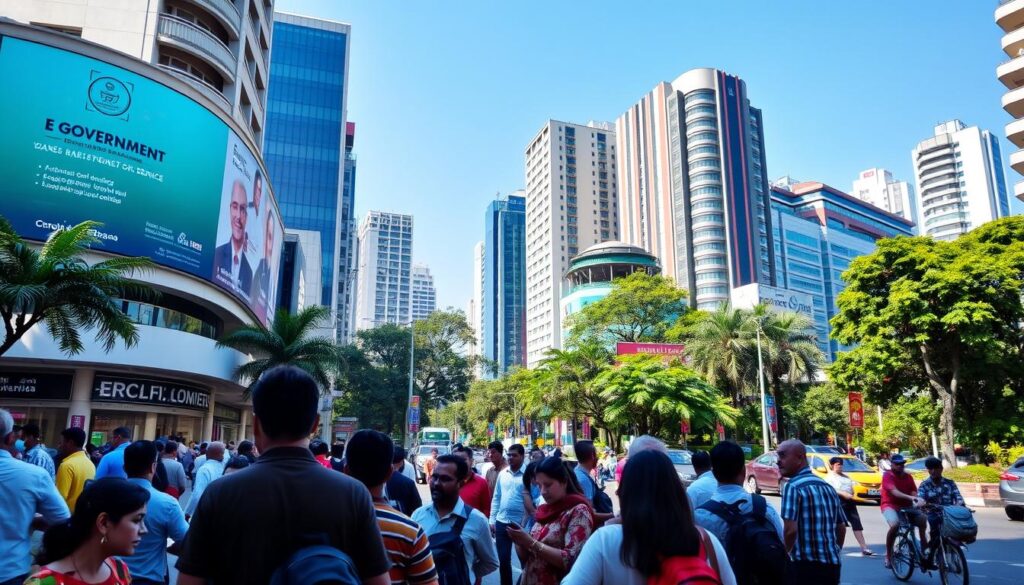Sri Lanka’s E-Government Services Expand Amidst Pandemic
The South Asian island nation of Sri Lanka is seeing big changes in how it’s run. Thanks to digital transformation, the government is pushing fast to get online government services out there. This ensures important work can still happen, even in tough times. The pandemic has really made the move to remote access to government services take off. It’s all part of a plan to grow Sri Lanka’s digital economy.
With the help of State Minister Kanaka Herath, Sri Lanka has big digital goals. They want their digital economy to hit about $15 million by 2030. That’s a huge jump from $4 million in 2022. They’ve set up a plan with the National Digital Strategy 2030. It aims to get more people online and build a strong digital infrastructure.
COVID-19 shook things up, but Sri Lanka kept moving forward. More people are using the internet and social media now than before. The government is working hard to make e-services better. And they’re excited about starting a new digital ID system.
At the same time, Sri Lanka is beefing up its digital laws. They’ve approved the Data Protection Act. This creates a new Data Protection Authority. They’re also working on a Cyber-Security Act. These moves are all about keeping data safe and making sure their digital government is strong.

Sri Lanka’s dedication to digital is inspiring. It’s not just about technology; it’s about bringing people together and making life better. They’re using tech to improve things like health and farming. This will keep the economy and people’s health strong after the pandemic.
Sri Lanka’s E-Government Services Expand Amidst Pandemic
Sri Lanka has taken big steps in digital governance, especially because of COVID-19. It is working on making government e-services and improving government digital infrastructure better. This helps meet the urgent needs of its people. It also increases digital use among them.
The Genesis of Digital Governance in Sri Lanka
Sri Lanka started its digital governance to improve life quality. It looked up to Estonia, known for its digital success. Sri Lanka wants to raise its digital literacy rate and get more people online. Right now, only 37% of its residents use the internet.
Even with better technology and lower costs, more digital projects are needed. A big problem is that many people don’t know enough about how to use digital tools well.
Accelerated Digital Transformation Through National Digital Strategy 2030
COVID-19 made Sri Lanka push its digital change faster with its National Digital Strategy 2030 plan. This plan uses technology to help in social and economic growth. By improving government e-services, it builds a strong digital environment. This prepares Sri Lanka for future challenges and ensures everyone can access information and services.
The Role of ICTA During the COVID-19 Outbreak
During COVID-19, the ICTA showed how vital it is. It came up with digital solutions to help manage the crisis. ICTA created apps like MyHealth Sri Lanka. These apps shared important information and helped with things like airport clearances and tracking contacts.
The work by ICTA supports digitalization initiatives and the aim to improve government digital infrastructure. These efforts link to the National Digital Strategy 2030. They show a plan to increase tourism, enhance public health, and promote digital skills. This creates a digital-first mindset in government and public actions.
| Year | Internet Penetration Rate (%) | Digital Literacy Rate (%) |
|---|---|---|
| 2019 | 29.3 | 28.6 |
| 2020 | 34.3 | 37.0 |
| 2021 | 38.5 | 42.0 |
As Sri Lanka moves forward after the pandemic, improving digital skills is key. By focusing on government e-services, the country is a model for blending digital and traditional governance. This approach makes the society more connected and stronger.
Driving Factors Behind the Surge in Digitalization
Sri Lanka is quickly becoming digital, thanks to several reasons. The COVID-19 pandemic made digital options a must. The country now aims to be a big part of the global digital marketplace. With over 60% of people having mobiles, there’s a strong base for digital growth. Sri Lanka’s digital sector is now worth almost US$3.47 billion. This shows the nation’s big push toward digital technology.
Working with other countries is key to Sri Lanka’s digital plans. For example, India helped fund the Unique Digital Identity Project with 450 million Indian rupees. This project and others like MOSIP show Sri Lanka’s effort to give its citizens a digital ID. But there have been challenges, like delays and worries about data safety. These issues highlight the need for strong privacy and security steps.
Sri Lanka is also focusing on digital education. Projects like ECD and AHEAD are enhancing digital skills among students. This effort is supported by the World Bank and the Asian Development Bank (ADB). The country is getting ready for a future with a digital-savvy workforce.
